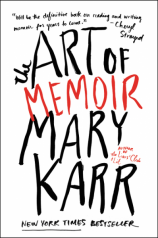Reading Group Guide
Discussion Questions
The Art of Memoir

1. For years Mary Karr resisted writing autobiographical nonfiction and instead wrote poetry and fiction. Why was this? How is each of these genres different? What are the strengths and limitations of each?
2. What particular abilities and talents make a great memoirist?
3. Examine Karr’s emphasis on the importance of carnality in memoir writing. Why is unique, sensory detail so important? How does it have “psychological effects” on a reader?
4. Both memoir writing and psychotherapy require the act of revisiting and articulating past experience, telling the stories. In what other ways are these two complex pursuits similar or different?
5. How does revisiting and engaging with past trauma or difficulty potentially transform its effects?
6. How does the unreliability of human memory influence a person’s attempt to understand herself? In what ways might a writer bridge gaps of information on the page?
7. How much of a person’s identity is the result of arbitrary early experience? To what extent can she forge a new identity? How might this influence the writing of memoir?
8. Given that “from the second you choose one event over another, you’re shaping the past’s meaning,” how should a memoir writer best think about and negotiate the truth of her experience? What is a necessary and appropriate balance of honesty and creativity in non-fiction writing?
9. Karr believes that lying is not just unethical for a writer but usually “carve[s] a lonely gap between your disguise and who you really are.” What are the effects of such a personal disassociation? Karr adamantly claims “each great memoir lives or dies…on voice.” What is voice? How does a writer develop it? How does “finding…inner truth about psychological conflicts” help?
10. What is the nature and importance of the “inner enemy” in a memoir? Why might “a blazing psychic struggle” be essential for the writer and the reader?
11. Karr admits that she “hid from readers on pages that sugarcoated any emotional truths,” and finds many of her talented students doing the same. Why is this resistance so common even after one has decided to write memoir?
12. Karr believes that memoirs often fail because “the narrator fails to change over time.” Why is experiencing and articulating personal change or transformation so essential?
13. Karr says, “every writer needs two selves --- the generative self and the editor self.” How are these essentially different? What’s the best way to balance them?
14. Considering writers like Maya Angelou, Maxine Hong Kingston and Michael Herr, in what ways can or should a memoir be a social or political act?
15. Considering G. H. Hardy’s self-evaluation in A MATHEMATICIAN’S APOLOGY, how might an earnest writer evaluate the value of her experience short of public recognition or financial success?
The Art of Memoir
- Publication Date: September 6, 2016
- Genres: Literary Criticism, Nonfiction
- Paperback: 256 pages
- Publisher: Harper Perennial
- ISBN-10: 0062223070
- ISBN-13: 9780062223074








